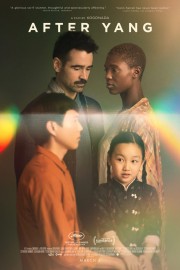After Yang
**Seen for the 2022 Sundance Film Festival.
Films about artificial intelligence have become a way for genre to explore fundamental elements of human emotions. Notice how I wrote artificial intelligence instinctively rather than robots? In comparison, robot feels like a vulgarity, something without a soul that is meant to serve, and not intended to resemble humanity. Artificial intelligence, rather, is something more sophisticated, something intended to be created in our image. In the annals of sci-fi history, isn’t R2-D2 as imbued with humanity, in our eyes, as David from “A.I. Artificial Intelligence?” And yet, one is considered just “a robot,” and the other is A.I. (and not just because of the title). Any time we’re presented with a machine intended to connect with a part of the human experience, the proper term, artificial intelligence, makes sense. “After Yang” is very much about artificial intelligence, and how it is capable of learning, and feeling, beyond its programming. I’m always going to respond to that.
In the context of the film, Yang is not unlike a pet dog gotten after a move, but with an encyclopedic memory. He is an android designed to help an adopted child connect with her own culture as she is assimilating into a new home. That alone is a fascinating premise, and I’m curious if the short story by Alexander Weinstein explores more that collective decision on the part of humanity. In his film, writer-director Kogonada uses Yang to explore the nature of memory and consciousness as a family is presented with a dilemma. Purchased by Jake (Colin Farrell) and Kyra (Jodie Turner-Smith) to help their adopted daughter, Mika (Malea Emma Tjandrawidjaja), feel connected to her heritage while also giving her someone to connect with as she is faced with a new living situation. The first thing we see is the family standing for a picture. Mika makes sure to tell Yang (Justin H. Min) to get in the picture with them. He is part of the family, and even takes part in family activities. One day, his programming begins to short circuit, and Jake is sent on a journey to try and repair him.
One of the things that is so engaging about “After Yang” is that it both explores the moral implications of artificial intelligence, and the emotional issues that would arise from losing a loved one. Jake’s journey to repair Yang takes him to getting a diagnostic to find out part of what’s not wrong with Yang, before going to a parts shop run by a conspiracy theorist (Ritchie Coster), who thinks- when he opens up Yang’s core- he’s found spyware intended to steal our information. The conspiracy theorist does, however, put him in contact with a museum that is looking to display examples of humanity; Yang would make for an interesting part of their exhibit. All the while, we see Jake looking at Yang’s recorded memories, which includes a lot of the family, as well as a blonde (Haley Lu Richardson) Yang seems to have an emotional attachment to. But how can a machine make an emotional connection to someone? Just one of the mysteries of life this film has in store.
Kogonada has created a lovely world for this film. There’s not a lot of futuristic touches, but what ones there are go beautifully into the overall aesthetic, which borrows much from Asian culture and architecture. The family’s house feels very inviting, and the outside world, when seen, is not dissimilar from our own. The film is beautifully shot by Benjamin Loeb, with music by Aska Matsumiya, whom also has a theme by the legendary composer, Ryuichi Sakamoto, to work with in creating the emotional landscape of this film.
“After Yang” looks at artificial intelligence as a way for helping humanity grow and love more in the future, which is part of its fascination. Like David in “A.I.,” Yang is intended as a helper for humans to move past some of the most painful moments of our lives. Though certainly not as difficult as the loss of a child, transitioning to a new life, in a new place, is difficult. I can see the value Yang has for Mika; the way she responds when he’s not well is not unlike how any of us feel when a pet is not healthy. “After Yang” doesn’t just put our emotions on the pet, though, but gives us a glimpse of what meant most to them. That’s where it really finds its power. By doing so, Jake is able to make the best choice for his family. All of his family, Yang included.










